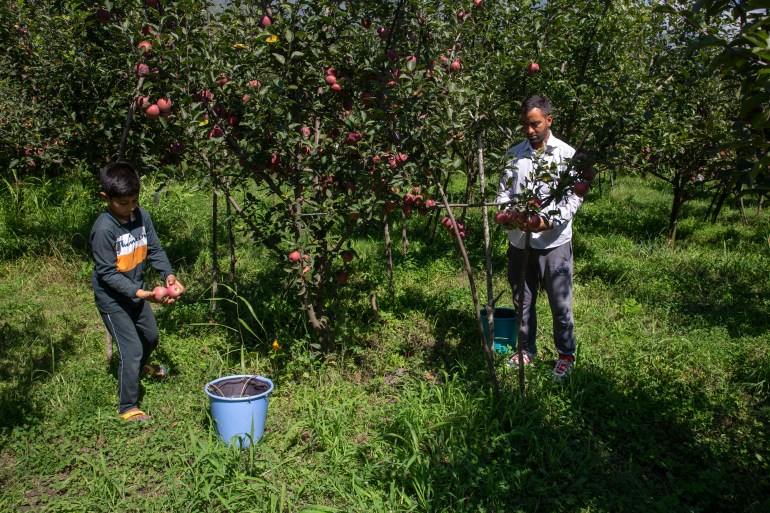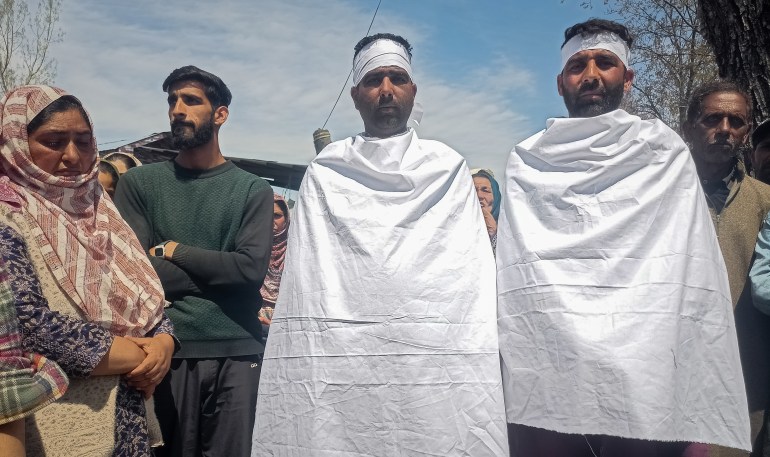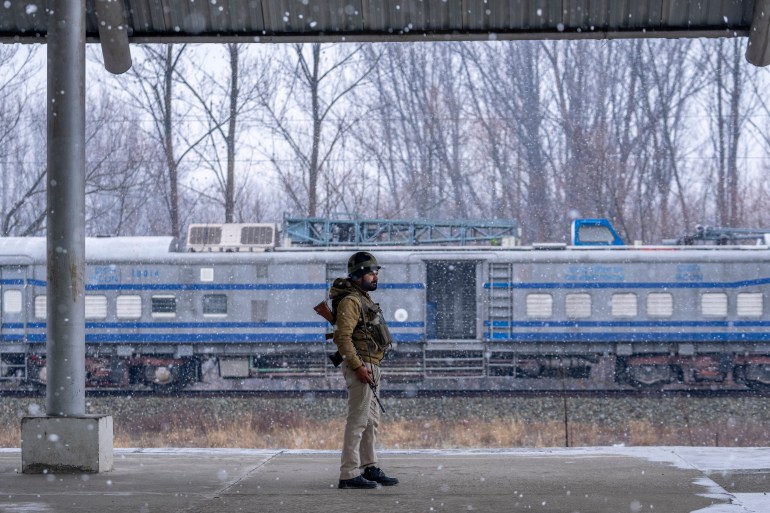[
Indian Administered Kashmir – Muhammad Shafi was working in his apple orchard in Indian-administered Kashmir in October final 12 months when a bunch of males got here and began measuring his land with out his consent.
When he requested the boys who they have been and what they have been doing on his land, Shafi stated he was shocked by their response. They have been authorities officers despatched to mark and measure his backyard for the development of the railway line.
“They stated the land can be used to construct railway tracks and roads,” Shafi, 65, advised Al Jazeera at his house within the Bijbehara space of Anantnag district within the Himalayan area. “They requested us to chorus from engaged on their land.”
Shafi's 1,500 sq. meter (16,145 sq ft) apple farm has been deserted because the go to by officers. Buds have fashioned on the branches, the bushes have turn out to be moist and it’s time to spray pesticides on them.
However Shafi can't maintain his farm, which is now outfitted with two 15 cm (0.5 ft) concrete pillars set by the authorities for the proposed 77 km (48-mile) Anantnag-Bijbehara-Pahalgam railway line, about 190 km It’s one in all a complete of 5 such initiatives. (118 miles) throughout the picturesque Kashmir Valley.
The land to be acquired for development is very fertile for rising apples, probably the most well-known export from the area.

'Apple bowl of Kashmir'
Apple cultivation is the biggest employment generator in Indian-administered Jammu and Kashmir, with roughly 3.5 million farmers – 27 % of the area's inhabitants – concerned in rising the fruit, whose exports contribute greater than 8 % of the area's gross home product (GDP). provides. ,
Apple growers say they’ve spent their whole lives – and their restricted assets – rising orchards, solely to have authorities forcibly take them away. Shafi's backyard now successfully belongs to the federal government, an acquisition he didn’t join.
Many residents stated that authorities survey groups had include police and safety forces to measure their orchards – in impact stopping any significant resistance from farmers. “We’re not allowed to protest and even elevate our voices,” Shafi stated. “We’re helpless.”
Vamik*, from Shopian district in south Kashmir, stated he obtained a discover from the federal government on February 23, saying his 5,000-square-metre (54,000 sq ft) apple orchard could be taken over by the federal government to construct a railway line. Shall be taken.
However, many Kashmiri farmers have been protesting on the streets because the land acquisition started. At one such protest in Shopian, often known as the “Apple Bowl of Kashmir”, Vamik stated farmers had no choice however to combat for his or her land.
“There may be already a scarcity of job alternatives and now they’re depriving us of the one means we’ve got. We now have no different expertise, we don't know tips on how to survive with out it and no sum of money will compensate for the loss,” stated the 25-year-old.
“In the event that they take our land we’ll die of starvation anyway, so it’s higher to die preventing for our land,” he stated.

Connectivity boon and worry
Definitely, Kashmiris have lengthy demanded higher connectivity. The Kashmir Valley area has a nationwide freeway that’s typically blocked by landslides and rock falls throughout inclement climate in summer time and snowfall throughout winter, reducing it off from the remainder of the nation, typically for days. .
Three a long time in the past, within the mid-Nineteen Nineties, the Authorities of India launched a railway venture in a number of phases to get rid of freeway dependence. The venture is anticipated to be accomplished by August and can join Kashmir with the remainder of India by way of an all-weather rail line for the primary time.
Final 12 months, the Authorities of India permitted a venture to additional develop this rail initiative inside Kashmir. The transfer might assist enhance transportation inside Kashmir.
However many Kashmiris say that constructing the railway line would imply buying about 278 hectares (686 acres) of extremely fertile land, a lot of which is apple orchards.
Anantnag farmer Shamshada Akhtar is amongst those that might quickly lose his orchard. “We spent some huge cash rising the backyard – labor prices, fertilizers, pesticides yearly for greater than 12 years… for what? Solely the officers have been allowed to take it away for some nominal compensation,” the 43-year-old man stated.
Authorities haven’t disclosed particulars of the compensation to be paid, however many growers say they are not looking for the cash.
“The one-time compensation just isn’t going to feed us ceaselessly. Orchards are a supply of livelihood not just for us however for our future generations,” Akhtar stated. “It's a sense for growers like us.”
Worry of shedding land – and livelihoods – amongst residents of Indian-administered Kashmir is heightened by mistrust of Prime Minister Narendra Modi's Hindu-majority Bharatiya Janata Occasion (BJP) authorities, which ended the area's particular semi-autonomous standing in 2019. Gave it and introduced it beneath his management. Direct management of New Delhi.
The federal government claimed the transfer would convey peace, spur funding and create extra jobs within the nation's largest Muslim-majority area, which has been the positioning of a bloody insurgency in opposition to Indian rule for many years and is house to 1000’s of individuals. Most of them civilians have been killed.
Shafi stated, there at the moment are rumors that the land taken for railway initiatives can be used primarily to enhance connectivity to Pahalgam, a Hindu pilgrimage web site within the well-known vacationer vacation spot of Anantnag district.
BJP's regional spokesperson Altaf Thakur dismissed these rumours. “Railway traces can be utilized by all folks all year long and no non secular shade ought to be given to it,” he stated.

'Don't need, don't need'
Then there are ecological considerations. Some specialists imagine that the railway traces will scale back the forest space, posing a risk to the native economic system and ecology.
Kashmiri environmentalist Raja Muzaffar Bhat advised Al Jazeera that authorities ought to “make efforts to avoid wasting the land as a substitute of utilizing it for development functions”.
“The primary railway connection was a lot wanted, however the railway traces passing by way of Shopian, Anantnag and different districts require large reducing of bushes, placing the livelihood of lakhs (tons of of 1000’s) of individuals within the space in danger,” he stated. Will fall.” ,
Bhatt argued that the land acquisition can also be a violation of a regulation enacted in 2019 that ensures truthful compensation, transparency and rehabilitation for folks affected by such infrastructure initiatives. “It’s a democratic regulation the place you must seek the advice of each stakeholder earlier than buying any land,” he stated. “It’s unlawful to erect concrete pillars on land with none discover, with out taking the native folks into confidence.”
However BJP spokesperson Thakur rejected the allegation that legal guidelines have been violated. “The transfer was taken after considering environmental elements and consulting all stakeholders within the area,” he advised Al Jazeera.
When requested about allegations of land grabbing by the federal government for railway enlargement, he stated: “At this level of time, I don't know what folks need, however for these railway initiatives, some land can be required and a few land can be required. Bushes can be minimize. Course of. Due to this fact, all of us ought to wholeheartedly welcome this improvement within the area.”
Michael Kugelman, director of the South Asia Institute on the Wilson Heart in Washington, DC, stated infrastructure initiatives that have been seen as “extra innocent” earlier than 2019 at the moment are regarded “with higher suspicion” by Kashmiris.
“Particularly on condition that for many individuals in Kashmir, it’s not the shortage of improvement that considerations native residents, however extra the extent of presidency management in New Delhi,” he stated. “For a lot of in Kashmir, this can be a case of New Delhi bringing in additional of one thing that’s neither wanted nor needed.”
Kugelman stated there may be “no cause to imagine” that locals can have an issue with momentary guests reminiscent of pilgrims or vacationers. “The priority is extra in regards to the potential for brand new buyers and different residents who’re planning to come back for the long run – and what which may imply when it comes to long-term social and demographic impacts.”
In the meantime, in Bijbehara, Shafi, a father of 4, stated he initially labored as a laborer in others' apple orchards to feed his household till he was capable of purchase a farm for himself. . He stated the bushes on which he labored for practically a decade lastly began bearing apples, incomes the household about Rs 500,000 (about $6,000) yearly.
Now he hardly ever goes to his backyard. “Each time I see the flowers blooming in my backyard, on the bushes, I really feel unhappy,” he stated as tears welled up in his eyes.
“I discover it tough to even take into consideration how I will present a livelihood to my kids.”
*The identify of a farmer has been modified at his request as a consequence of worry of retaliation from the federal government.

